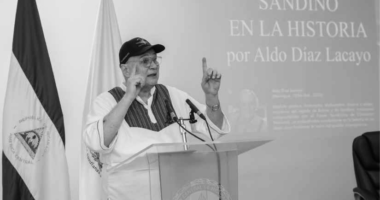
Sentencia de Corte Mundial sobre Israel y Fallo de 1986 contra Estados Unidos en el caso de Nicaragua
Por Nat Parry
Nat Parry es el autor del libro de próxima aparición Samuel Adams and the Vagabond Henry Tufts: Virtue Meets Vice in the Revolutionary Era. Es editor de American Dispatches: A Robert Parry Reader.
El 26 de noviembre de 1984, la Corte de Justicia Internacional de La Haya consideró el caso Nicaragua vs. Estados Unidos sobre actividades militares y paramilitares en y contra Nicaragua. (Foto de la ONU)
Ahora que la Corte Internacional de Justicia ha dictaminado que las acusaciones de genocidio planteada por Sudáfrica contra Israel son plausibles y ha ordenado a Israel “tomar todas las medidas a su alcance para impedir la comisión de todos los actos dentro del alcance” de la Convención de las Naciones Unidas sobre Genocidio, el interrogante es como responderán Israel y sus partidarios.
Israel tiene un mes para presentar un informe sobre las medidas que está adoptando para cumplir las órdenes del tribunal. Aunque el tribunal no tiene ningún mecanismo de ejecución, las órdenes son obligatorias e intensifican sustancialmente la presión internacional sobre Israel y sus partidarios. Las sentencias de la CIJ son definitivas y no son apelables.
Si Israel no cumple, el asunto podría llegar al Consejo de Seguridad de la ONU, donde Estados Unidos tendrá que decidir si ejerce su veto. Si es vetado en el Consejo de Seguridad, el asunto podría presentarse a la Asamblea General, donde Estados Unidos no tiene veto, y el resultado podría ser una votación abrumadora –y profundamente embarazosa– en apoyo al fallo de la CIJ.
Algunos aliados de Israel han pedido que se cumpla la sentencia. “La Corte Internacional de Justicia no se pronunció sobre el fondo del caso, pero ordenó medidas preventivas en un procedimiento provisional”, dijo la ministra alemana de Asuntos Exteriores, Annalena Baerbock. “Estos son vinculantes según el derecho internacional. Israel también debe cumplirlas”.
Estados Unidos, por otra parte, descartó la noción de que las acciones en la Franja de Gaza constituyan genocidio. “Seguimos creyendo que las acusaciones de genocidio son infundadas y observamos que el tribunal no llegó a una conclusión sobre genocidio ni pidió un alto al fuego en su fallo y que pidió la liberación inmediata e incondicional de todos los rehenes retenidos por Hamas”, dijo un portavoz del Departamento de Estado.
Hasta ahora, la reacción de Israel ha sido predeciblemente belicosa: el Primer Ministro Benjamín Netanyahu dijo el sábado que las acusaciones de genocidio contra Israel son “ridículas” y demuestran “que muchos en el mundo no han aprendido nada del Holocausto”. La principal lección del Holocausto dijo, “es que sólo nosotros nos defendemos por nosotros mismos. Nadie lo hará por nosotros”.
Mirando Hacia el Pasado
Para tener una idea de cómo podría desarrollarse esto, sería útil mirar el pasado, en particular un caso del Tribunal Mundial de hace 40 años.
En 1984, Nicaragua presentó una demanda contra Estados Unidos ante la Corte Mundial con relación a las políticas estadounidenses de armar, entrenar y financiar a los rebeldes contrarrevolucionarios que luchaban por derrocar al gobierno de Nicaragua, así como minar los puertos de la pequeña nación centroamericana.
Estados Unidos, pretendiendo justificar sus políticas, afirmó que actuaba en Nicaragua sólo en “autodefensa colectiva”, justificación que el tribunal en su Fallo de 1986 rechazó por 12 votos a 3.
El tribunal dictaminó además de manera abrumadora que Estados Unidos, “al entrenar, armar, equipar, financiar y suministrar a las fuerzas de la contrarrevolución… ha actuado contra la República de Nicaragua, en violación de su obligación bajo el derecho internacional consuetudinario de no intervenir en los asuntos internos de otro Estado.”
Determinó que Estados Unidos había estado involucrado en el “uso ilegal de la fuerza”, con violaciones que incluían ataques a instalaciones y buques navales nicaragüenses, invasión del espacio aéreo nicaragüense y el entrenamiento y armamento de los contras.
El tribunal también determinó que el presidente Ronald Reagan había autorizado a la C.I.A. “colocar minas en puertos nicaragüenses” y “que ni antes de la colocación de las minas, o posterior a ello, el Gobierno de Estados Unidos emitió ninguna advertencia pública y oficial a la navegación internacional sobre la existencia y ubicación de las minas; y cuáles fueron los daños personales y materiales causados por explosión de las minas”.
Se ordenó a Estados Unidos que cesara sus actividades y pagara reparaciones.
La respuesta de Estados Unidos a este fallo fue reveladora. Básicamente, desestimó la sentencia de la CIJ basándose en que Estados Unidos debe “reservarse la competencia para determinar si la Corte tiene jurisdicción sobre nosotros en un caso particular” y qué se encuentra “esencialmente dentro de la jurisdicción interna de Estados Unidos”.
En otras palabras, la administración Reagan consideró los ataques armados contra el Estado soberano de Nicaragua dentro de su “jurisdicción interna”.
Sin inmutarse, Nicaragua llevó el asunto al Consejo de Seguridad de la ONU, donde el representante nicaragüense argumentó que el recurso ante la CIJ era uno de los medios fundamentales para la solución pacífica de disputas establecidos por la Carta de la ONU.
Enfatizó además que era esencial que el Consejo de Seguridad y la comunidad internacional recordaran a Estados Unidos su obligación de acatar el fallo de la corte y poner fin a su guerra contra Nicaragua.
Estados Unidos respondió que la jurisdicción de la CIJ era una cuestión de consentimiento y que Estados Unidos no había dado su consentimiento a la jurisdicción de la CIJ en este caso. El embajador afirmó que la política estadounidense hacia Nicaragua estaría determinada únicamente por los intereses de seguridad nacional de Estados Unidos, señalando que Nicaragua mantenía estrechos vínculos de seguridad con Cuba y la Unión Soviética.
El 28 de octubre de 1986, Estados Unidos vetó la resolución que pedía el cumplimiento total e inmediato de la sentencia de la CIJ, con la abstención de Francia, Tailandia y el Reino Unido.
Tras esta decisión, Nicaragua recurrió a la Asamblea General, que aprobó una resolución con 94 votos contra 3 pidiendo el cumplimiento del fallo del Tribunal Mundial. Sólo dos estados, Israel y El Salvador, se unieron a Estados Unidos en oposición.
Un año después, el 12 de noviembre de 1987, la Asamblea General volvió a pedir el “cumplimiento total e inmediato” de la decisión de la CIJ. Esta vez sólo Israel se unió a Estados Unidos para oponerse al cumplimiento del Fallo.
En un artículo en The American Journal of International Law, Anthony D’Amato, argumentó que “el derecho colapsaría si los acusados sólo pueden ser demandados cuando aceptan ser demandados, y la medición adecuada del impacto de ese colapso no sólo sería la drástica disminución del número de casos, pero también la necesaria reestructuración de un vasto sistema de transacciones y relaciones jurídicas basadas en la disponibilidad de tribunales como último recurso”.
Esto, afirmó, sería “un regreso a la ley de la jungla”.
Si el caso actual contra Israel se desarrolla de manera similar al de Nicaragua en 1984 sería una prueba importante para el sistema internacional, y específicamente sobre qué impera: la ley de la jungla o el “orden internacional basado en reglas” que Estados Unidos frecuentemente afirma defender.
Huelga decir que Estados Unidos nunca reconoció su obligación de acatar el Fallo y continúo afirmando que no consintió en la jurisdicción de la CIJ.
El caso provocó una avalancha de criticas por parte de expertos en Derecho Internacional. Noreen M. Tama escribió en Penn State International Law Review que “la Corte Internacional de Justicia es la autoridad final en cuestión de su propia jurisdicción”.
Destacó que “la Corte claramente tuvo competencia incidental necesaria para dictar medidas provisionales en el caso Nicaragua vs. Estados Unidos”.
On Nov. 26, 1984, the Court of International Justice in The Hague considered the case of Nicaragua vs. the United States concerning military and paramilitary activities in and against Nicaragua. (UN Photo)
Now that the International Court of Justice has ruled that South Africa’s claims of genocide against Israel are plausible and ordered Israel to “take all measures within its power to prevent the commission of all acts within the scope” of the U.N. Convention on Genocide, the question is how Israel and its backers will respond.
Israel has one month to submit a report on the steps it is taking to comply with the court’s orders. Although the court has no enforcement mechanism, the orders are mandatory and substantially increase the international pressure on Israel and its supporters. ICJ judgments are final and without appeal.
If Israel does not comply, the issue may go to the U.N. Security Council where the United States will have to decide whether to exercise its veto. If that effort fails, it could then go to the General Assembly, where the U.S. has no veto, and the result could be an overwhelming — and deeply embarrassing — vote supporting the ICJ’s ruling.
Some allies of Israel have called for compliance with the ruling. “The International Court of Justice did not rule on the merits of the case but ordered provisional measures in interim proceedings,” German Foreign Minister Annalena Baerbock said. “These are binding under international law. Israel must also comply with them.”
The United States, on the other hand, dismissed the notion that actions in the Gaza Strip constitute genocide. “We continue to believe that allegations of genocide are unfounded and note the court did not make a finding about genocide or call for a ceasefire in its ruling and that it called for the unconditional, immediate release of all hostages being held by Hamas,” a State Department spokesperson said.
So far, the reaction from Israel has been predictably bellicose, with Prime Minister Benjamin Netanyahu saying on Saturday that the allegations of genocide against Israel are “ridiculous” and demonstrate “that many in the world have not learned a thing from the Holocaust.” The main lesson of the Holocaust, he said, “is that only we will defend ourselves by ourselves. Nobody will do it for us.”
Looking to the Past
For an idea of how this might play out, it could be useful to look to the past, in particular a World Court case from 40 years ago.
In 1984, Nicaragua brought suit against the U.S. in the World Court in relation to U.S. policies of arming, training and financing the contra rebels who were fighting to overthrow the Nicaraguan government, as well as mining the harbors of the small Central American nation.
The United States, in justifying its policies, claimed that it was acting in Nicaragua only in “collective self-defense,” a justification that the court rejected by a vote of 12-3 in its 1986 ruling.
The court further overwhelmingly ruled that the United States, “by training, arming, equipping, financing and supplying the contra forces … has acted, against the Republic of Nicaragua, in breach of its obligation under customary international law not to intervene in the affairs of another State.”
It determined that the United States had been involved in the “unlawful use of force,” with violations including attacks on Nicaraguan facilities and naval vessels, the invasion of Nicaraguan air space and the training and arming of the contras.
The court also found that President Ronald Reagan had authorized the C.I.A. “to lay mines in Nicaraguan ports” and “that neither before the laying of the mines, nor subsequently, did the United States Government issue any public and official warning to international shipping of the existence and location of the mines; and that personal and material injury was caused by the explosion of the mines.”
The U.S. was ordered to cease its activities and pay reparations.
The response of the United States to this ruling was revealing. The U.S. essentially dismissed the ICJ judgment on the grounds that the United States must “reserve to ourselves the power to determine whether the Court has jurisdiction over us in a particular case” and what lies “essentially within the domestic jurisdiction of the United States.”
In other words, the Reagan administration considered armed attacks against the sovereign state of Nicaragua within its “domestic jurisdiction.”
Undeterred, Nicaragua then brought the matter to the U.N. Security Council, where the Nicaraguan representative argued that recourse at the ICJ was one of the fundamental means of peaceful solution of disputes established by the U.N. Charter.
He further emphasized that it was essential for the Security Council and the international community to remind the United States of its obligation to abide by the court’s ruling and cease its war against Nicaragua.
The United States responded that the jurisdiction of the ICJ was a matter of consent and that the U.S. had not consented to the jurisdiction of the ICJ in this case. The ambassador asserted that U.S. policy towards Nicaragua would be determined solely by the national security interests of the United States, noting that Nicaragua maintained close security ties to Cuba and the Soviet Union.
On Oct. 28, 1986, the U.S. vetoed the resolution calling for full and immediate compliance with the ICJ’s judgment, with France, Thailand and the United Kingdom abstaining.
Following this decision, Nicaragua turned to the General Assembly, which passed a resolution 94-to-3 calling for compliance with the World Court ruling. Only two states, Israel and El Salvador, joined the U.S. in opposition.
A year later, on Nov. 12, 1987, the General Assembly again called for “full and immediate compliance” with the ICJ decision. This time only Israel joined the United States in opposing adherence to the ruling.
Anthony D’Amato, writing in The American Journal of International Law, argued that “law would collapse if defendants could only be sued when they agreed to be sued, and the proper measurement of that collapse would be not just the drastically diminished number of cases but also the necessary restructuring of a vast system of legal transactions and relations predicated on the availability of courts as a last resort.”
This, he said, would be “a return to the law of the jungle.”
Whether the current case against Israel plays out similarly to the 1984 case is a major test for the international system, and specifically about which reigns: the law of the jungle or the “rules-based international order” that the U.S. frequently champions.
Needless to say, the United States never recognized its obligation to adhere to the ruling, continuing to assert that it did not consent to the ICJ’s jurisdiction.
The case led to a flurry of criticism from international law experts, with Noreen M. Tama writing in the Penn State International Law Review that “the International Court of Justice is the final authority on the issue of its own jurisdiction.”
She pointed out that “the Court was clearly seized of the requisite incidental jurisdiction necessary to indicate interim measures in the case of Nicaragua v. United States.”




